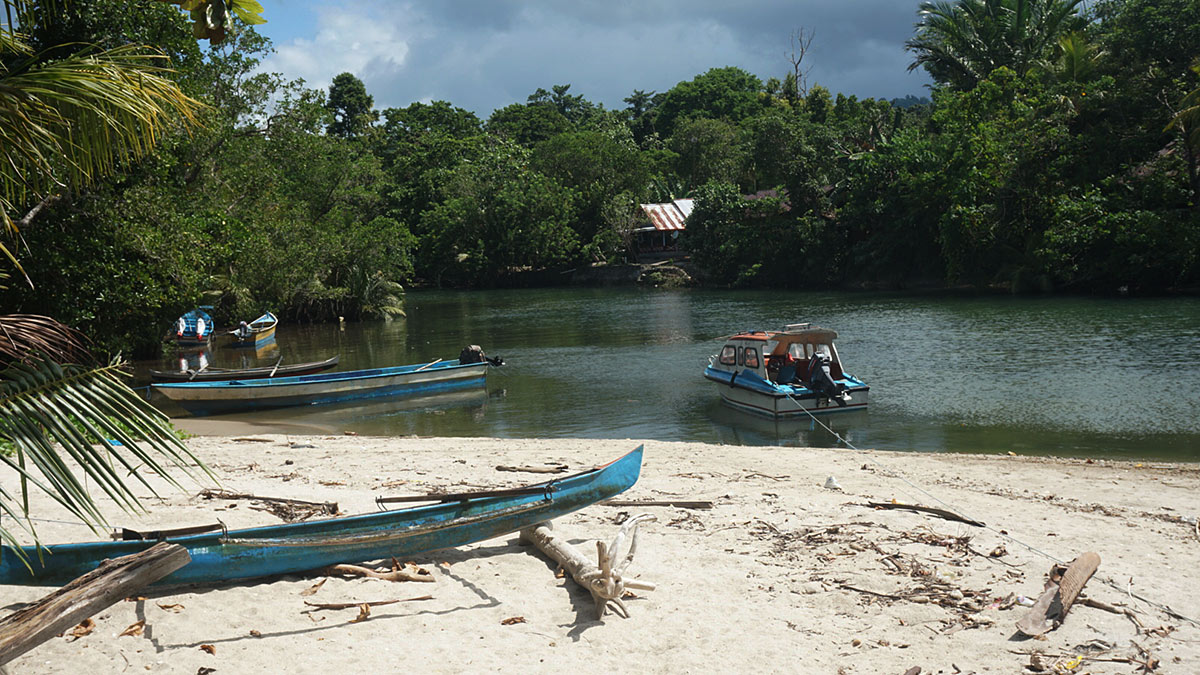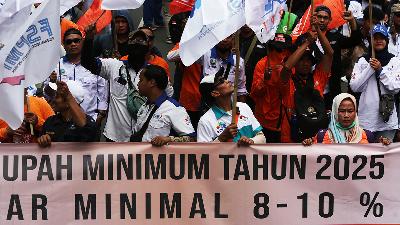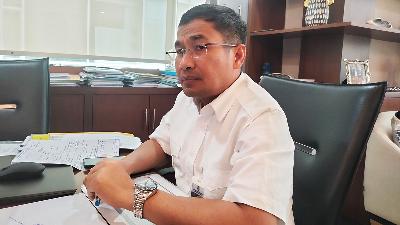Sasi in Maluku: An Ancient Tradition to Protect Natural Resources
Monday, December 2, 2024
Amid rampant fish poaching in Indonesian waters, traditional communities in Maluku enforce sasi, a practice that protects the seas and coasts.
arsip tempo : 174549631982.

WAVES crash softly in silence at the estuary where the river meets the beach in Negeri Haruku on Haruku Island, Central Maluku Regency. The ripples gently lap against four motorboats docked on the shore. On Monday, November 11, 2024, low waves broke around motorboats returning from Tulehu Harbor in Ambon, Maluku, a journey of about 30 minutes from Haruku by speedboat.
To the residents of Negeri (village) Haruku, the final quarter of the year is the most awaited for as customary leaders will normally announce open sasi. Sasi is a tradition passed down throughout generations, prohibiting anyone from harvesting natural resources during a specific period. The tradition is meant to protect the natural resources and environment, including the sea and coastal areas.
In Negeri Haruku, the community practices sasi lompa, referlompring to the lompa fish (Thryssa baelama) that gather at the estuary. When the sasi is lifted—typically for just one day—the community is allowed to catch the fish. However, once sasi lompa is reinstated, no one is permitted to fish.
Eliza Kissya, the Chief of Kewang—a customary institution in Maluku tasked with preserving the environment, especially customary territories and waters—in Negeri Haruku, explained that sasi lompa aims to maintain the lompa fish population and protect them from overfishing. The residents of Negeri Haruku strictly adhere to the rules of sasi. “We don’t want our sea to be damaged or its resources to be depleted,” said Eliza, 75.
Illegal fishing is a serious issue in Indonesia’s eastern waters. In late October 2024, the East Nusa Tenggara Regional Police reported four cases of illegal fishing in their waters. According to the police, the perpetrators used fish bombs to plunder marine resources.
An investigative report by Tempo in collaboration with Jaring.id revealed that several foreign fishing vessels banned during the tenure of former Maritime Affairs and Fisheries Minister Susi Pudjiastuti had returned to sea. These vessels were previously subject to a fishing permit moratorium due to extensive fish poaching.
Eliza shared that the tradition of sasi in her area has been practiced for decades. During this time, he has never witnessed reckless fishing, such as the use of fish bombs. He believes that implementing sasi has significantly preserved the marine ecosystem in Negeri Haruku.
One indicator of its success is the abundant arrival of lompa fish during sasi relaxation, signaling the community’s opportunity to fish. “This is the tangible impact of sasi on our marine ecosystem,” said Eliza, who was a member of the Indigenous People’s Alliance of the Archipelago (AMAN) from 2007 to 2012.
According to Eliza, sasi begins when mature lompa fish ready to spawn appear near Haruku’s coast, typically from April to May. When the fish migration starts, Eliza erects wooden stakes wrapped in young coconut leaves at the estuary, marking the start of sasi lompa.
Several regulations come into effect once the stakes are planted. Residents are prohibited from fishing, and motorboats are forbidden from crossing the Learissa Kayeli River, which runs through Negeri Haruku. Various literatures indicate that the protected sasi area extends 200 meters from the shoreline into the open sea, and over 2,000 meters along the river.
The traditional community imposes sanctions on violators, usually in the form of fines. However, if children are caught violating the rules, they are punished with five lashes from a rattan cane. “This punishment has symbolic meaning,” said Eliza. The five lashes signify the child’s responsibility to the five major soa (clans) in Negeri Haruku.
The last sasi lompa relaxation occurred in October 2023, celebrated by nearly all residents of Negeri Haruku. One of them, Tuty Ririmasse, recounted how the community held a ritual called panas sasi on the night before the sasi relaxation.
During the ritual, residents burned coconut leaves to invite the lompa fish into the estuary. “Every night, we burned the leaves, hoping more fish would come,” said the 54-year-old woman.
Tuty also observed participants singing during sasi opening. As the tide receded, a tifa (a small drum) was struck once to signal participants to gather at the river. A second beat instructed them to move closer to the estuary. The third drumbeat indicated that traditional leaders and priests had arrived at the river, and residents were then allowed to position themselves to catch fish along the riverbanks.
According to Tuty, the customary leaders and priests were the first to cast nets into the river. Only then were residents permitted to catch the lompa fish. “We celebrate sasi as a festival, with abundant food,” she said.
Eliza Kissya emphasized that the fish caught sasi opening relaxation cannot be sold. Instead, participants are required to share their catch with the community. “Our tradition dictates that anyone harvesting lompa must give some of their catch to the elderly, widows, and orphans,” he explained.
The sasi tradition is not exclusive to Negeri Haruku. A similar practice exists in Negeri Morela, also in Central Maluku Regency. Before adopting sasi, residents there used bombs and poison to exploit marine resources. “After sasi was implemented, such practices ceased,” said Fauzi Latukau in Morela on Sunday, November 10, 2024.
The sasi tradition in Negeri Morela differs slightly from Negeri Haruku’s. In Morela, sasi follows an auction system. Residents can propose specific areas for sasi enforcement. If approved, they are responsible for monitoring illegal fishing activities in that area.
Fauzi once proposed managing a sasi area in the sea after witnessing other people using bombs and poison. “I spent Rp5 million (around US$314) to secure sasi management rights,” said Fauzi, an Islamic religious teacher. The money was deposited into Negeri Morela’s treasury.
As a sasi manager, Fauzi oversees fishing in a designated area. Unlike sasi lompa in Negeri Haruku, Fauzi allows people to catch fish under certain restrictions. However, illegal methods, such as bombing and poisoning, occasionally occur, usually at night when monitoring lapses.
Fauzi and the traditional authorities in Negeri Morela also impose sanctions for violations. Those caught using fish bombs are brought to the local authority office and face the customary elders. They are then required to sign a statement pledging not to repeat their actions. “The community has become more aware of sasi rules,” Fauzi said.
Sasi is also practiced in Negeri Rutong, South Leitimur subdistrict, Ambon. According to Bobi Makatita—a landowner and part of the first clan to reside in the area—sasi was last lifted in April 2024. “We were allowed to fish because it was not among the forbidden marine resources,” he said.
Bobi said that one of the signs of sasi relaxation in Negeri Rutong is a flag tied with a rope. When sasi is reinstated, residents are forbidden from catching keong lola (Trochus niloticus), sea cucumbers (Holothuria atra), and lobsters—three most valuable marine species in the area. “The local authority enforces the rules and imposes a fine of Rp500 million (US$31,400) for violators,” said Bobi.
Muhammad Yusuf Sangadji, Executive Director of Jala Ina, an organization focused on marine conservation in Maluku, stated that sasi is more than a restriction on overexploiting marine resources. According to Yusuf, communities in Maluku implement sasi to protect the environment. “This tradition reflects the indigenous people’s respect for their relationship with nature,” he said.











